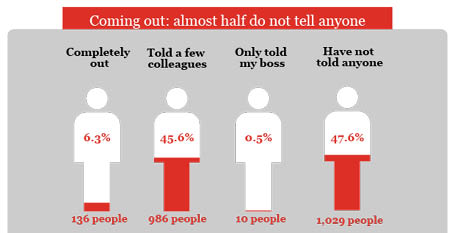Visit Aibai.org for more information, or read the full report here.
Tolerance of lesbian, gay, bisexual, and transgender (LGBT) individuals appears to be rising in Mainland China, at least among the digital generations. A February 2013 poll of users on Sina Weibo, one of China’s leading social networking sites, showed a majority favoring an amendment to China’s Marriage Law to allow for same-sex marriage.
But LGBT individuals in China still face a long road to acceptance, and over 90% of Chinese LGBT individuals who filled out a recent survey said they choose to conceal their sexual identity at work. The survey, “China Sexual Minorities Professional Environment Survey” was conducted by a coalition of China’s most active grassroots LGBT organizations. Over half of respondents say they have experienced harassment in the office, and workplace tolerance toward gay men at state-owned enterprises appears particularly low.
The charts below were published in May 2013 by the Aibai Culture and Education Center, a grassroots NGO based in Beijing, which released the results in a publication called “A Report on the Employment Environment for Chinese LGBT Employees.” The report is based on 2,161 completed questionnaires. Respondents included 1,371 men and 790 women, of which 1,856 identify as gay and lesbians and 305 as bisexual.












 打印版本
打印版本



















读者回应
China is one good example whereby its society still upholds the sanctity of heterosexual marriage, and the importance of physical procreation to continue the family blood and heredity to the next generation.
Hopefully the 'rainbow light' will enlighten this part of the world for the betterment of humanity...
请先登入再使用此功能。